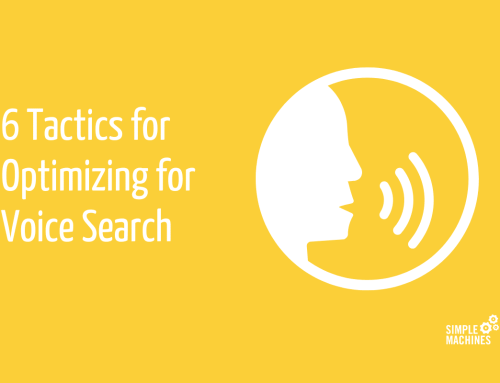Wondering why your website isn’t on the first page of Google search results?
Not sure how your competition – who you know you’re better than – is kicking your ass on search?
Wondering what you need to do to be seen by the people searching for businesses like yours?
First, the bad news: there’s no easy, quick solution to getting your website on the first page of Google (and anyone who tries to tell sell you otherwise is scamming you).
The good news: there are a lot of things you can do to improve your search engine optimization (SEO) that can (hopefully) lead to eventual first-page glory.
Today, I want to talk about the most important step you can take to improve your SEO: performing a website audit.
Understanding SEO: A Primer
Before we dive into website audits, let’s talk about SEO. There are a lot of misconceptions about SEO. SEO is complicated, but before you panic about your lack of knowledge, I should note that I would not expect anyone who isn’t directly responsible for website SEO to have a comprehensive understanding of all the ins and outs.
However, that doesn’t mean you shouldn’t have a basic understanding of SEO. To make sure we’re all on the same page about what SEO does (and doesn’t) entail, here are the basics:
- Search engine optimization “is the process of getting traffic from the “free,” “organic,” “editorial” or “natural” search results on search engines.”
- The goal of a search engine is to deliver the most relevant, high-quality results to a person who runs a search.
- To find those results, search engines crawl all of the websites they have indexed to determine what’s a good match for a search query. Keywords are an important part of SEO; websites with keywords that are similar to a user’s search inquiry signal relevance for that search, and therefore are more likely to be listed in results.
However:
- SEO isn’t just about keywords, and if you are only thinking about keywords when working to improve your search ranking, you’re setting your website up for failure.
- Search engines take into consideration hundreds of different characteristics of your website when determining where your website will be displayed in search results.
- Domain age (how old your website is), site structure (how easy it is to navigate your website and how much sense it makes to Google when they scan it), mobile optimization, and loading speed (how quickly everything loads on your page) are a few examples of the many factors Google judges your website on that are unrelated to keywords.
- The specific search results shown to one person may be different than the results for another person who performed the same search. How can that be? Search engines use a number of factors, such as your location and browsing history, to determine which websites are the best fits for the person performing a search.
If you’re interested in learning more about SEO, we recommend checking out Moz’s comprehensive Beginner’s Guide to SEO.
Now that we’ve got the basics out of the way, let’s talk about how website audits will help you as you work toward improving your website’s SEO.
What Is a Website Audit, and Why Do You Need to Do One?
The word “audit” often carries a negative connotation. However, I promise that, when it comes to your website, an audit is a hugely beneficial task that you’ll be happy you performed.
A website audit involves taking a close look at the metrics associated with your website in an effort to determine how successful your website is (and how it can be improved).
Whether you are looking to increase traffic, conversions, time spent on page, or something else, a website audit will arm you with real data to help you make smart, strategic decisions when you update (or redesign) your website.
Key metrics to look at during your website audit include:
What information should you be looking for during your site audit? This may vary depending on your end goal, but we recommend you collect the following information for every website audit:
- Monthly average of visits/visitors/unique visitors
- Top performing keywords (in terms of rank, traffic, and lead generation)
- Number of inbound linking domains
- Total number of total pages indexed
- Total number of pages that receive traffic
- Pages titles / lengths of page titles
- Descriptions / lengths of descriptions
- Duplicate page title and descriptions
- Duplicate content errors
- Internal link errors
- Unintentional 404s (Not Found) errors
A website audit tool like Screaming Frog can be used to easily gather this information for your audit.
Why Performing a Website Audit Is Crucial if You Want to See Real SEO Improvements
An audit is crucial because it allows you to make website updates based on fact instead of opinion. The result? You’ll actually see improvement in the metrics you care about.
For example: imagine your landing page is failing to convert visitors. You want them to fill out a contact form, but of the many visitors who visit the landing page, only a handful have completed the form. Your hunch is that the image on the page could be more appealing, so you change it…only to find that, a few weeks later, conversions are still low.
What gives?
If you had performed a website audit, you would have found that visitors were clicking on a link that took them off of your landing page (and away from the contact form you wanted them to fill out). An informed update would have been to remove the link to keep visitors on-page.
What if you’re trying to better optimize your most visited pages to keep up the momentum you’ve already started to generate?
After an audit determines which pages get the most traffic, you may start editing the content to optimize for the keywords you’ve discovered are your best performing, making sure page titles and description are in order, applying alt text to images, and updating internal links to make sure they’re working.
Another benefit of performing a website audit is that the information you gather will help you better focus your time and energy as you make website changes. You’ll know what’s working (and what you don’t need to spend time tinkering with) so you can focus on the tasks that will yield the biggest results.
No matter your website goals, whether they be big or small, always start with a website audit. You’ll ensure that your updates are necessary and effective.












